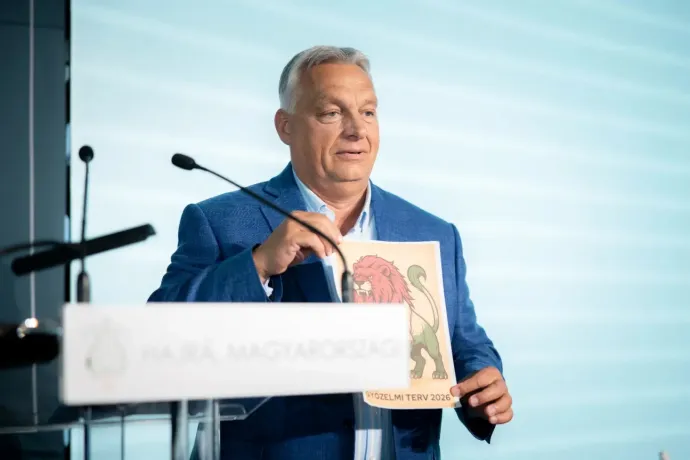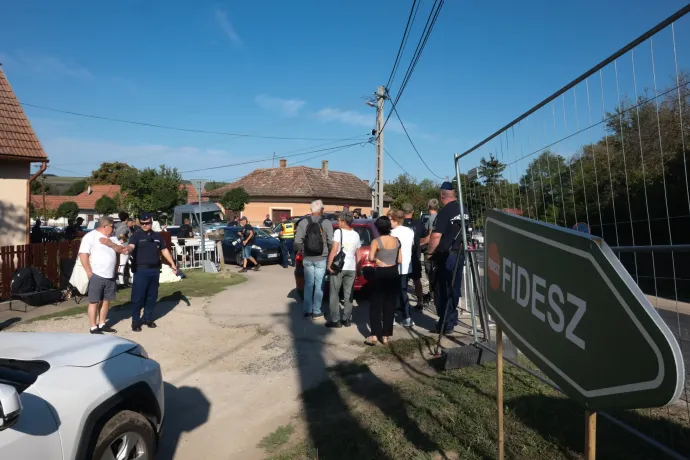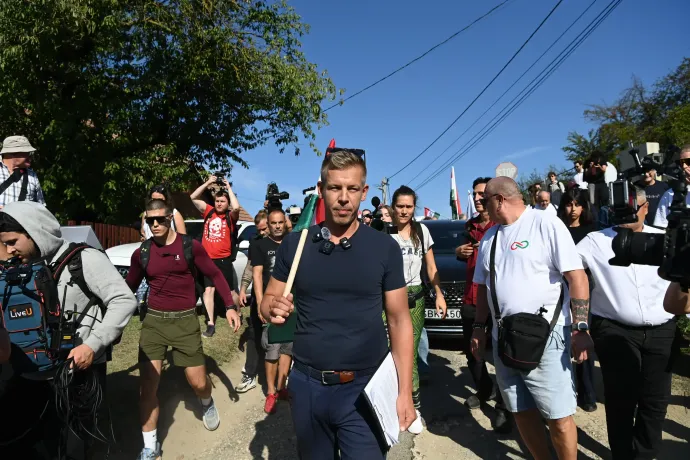
There were two events held just a few hundred meters from each other in the small village of Kötcse (population: 488) near Hungary’s lake Balaton on Sunday. The two gatherings were distinctly different from each other and they marked the umpteenth (un)official start of the election campaign for the country’s parliamentary elections set to be held next spring.
One of the events, Fidesz’s ‘picnic’ has been put on in the park of an 18th-century manor located here for more than twenty years, and has been known as a gathering of the Fidesz elite. It's been here, behind closed gates, that each fall, the carefully selected invitees have been able to listen to Viktor Orbán lay out his vision and plan for the season ahead. The press was never allowed in, and it was only through the pro-government media that the main points of the speech would occasionally be “leaked” to the public.

But things were different this year, and the reason for this was the other event held nearby, shortly before Orbán’s speech, just in time to disrupt the arrival of the governing party’s elite and those in their orbit coming for their picnic. The rally of the Tisza Party, held at the main square of the small village attracted people from all over Hungary, who had come to make a stand for change and hear the party’s leader, Péter Magyar speak. In an effort to make their party’s voice louder than that of their challenger, the opposition party’s event forced Fidesz to take an unprecedented step and broadcast Orbán’s speech live on several platforms.
Magyar: If we win the elections, we will lower taxes
Magyar and the Tisza Party coming to the doorstep of Fidesz’s elite gathering was seen by many as an attempt to take back control over public discourse, which is something that nobody has challenged Fidesz on in this form in quite a while. Tisza clearly opted for this move after the governing party accused them of planning to raise taxes and revoke some family tax allowances if they were to come to power next year.
The claim was introduced in an anonymous article published by a pro-government news outlet, referencing a supposedly leaked document in which Tisza’s “economic committee” was said to have detailed these plans. Tisza immediately denied that it had anything to do with the document, which is filled with contradictions and spelling mistakes.
There was also the political error of the party’s deputy president and MEP, Zoltán Tarr, spoken at a panel discussion, where he received a question about tax reform. Tarr said that “there are many things that shouldn’t be discussed in detail before the elections – one of these being the tax system –, but once the elections have been won, we’ll be able to do all of that”. Although Tarr was in essence explaining that there were some things they do not consider safe to talk about in much detail before the elections (for fear that whatever they say about these topics would be turned against them by the governing coalition), the pro-government press ran with this and suggested it was yet another proof that Tisza would raise taxes, and Tarr had just admitted to that. Viktor Orbán even called the matter “dead serious” and posted an edited video of Tarr’s sentences on his own social media page.

In his speech in Kötcse, Péter Magyar again stressed that they are actually planning on lowering taxes, and officially launched Tisza’s election campaign. He elaborated on their intention to make the public media provider independent again, and – among others – promised to make the country’s healthcare, social services and education systems effective and said that under their governance, Hungary would again become an active and trustworthy member of NATO and the EU.
Orbán: They would raise taxes, and we’ll consult the nation about it
Prime Minister Orbán’s speech began a few hours after Péter Magyar finished his. As mentioned before, unlike in years past, the entire speech (and several hours’ worth of coverage from inside the Fidesz picnic) was streamed live, signaling where Fidesz intends to strengthen its campaigning this time: online. Orbán said that they made the whole thing public “primarily because of their enemies”, and explained that if they are to win next year, they “must also fight in the digital arena, and must speed up the digital construction work”.
Fidesz’s fight in the digital arena has indeed been speeding up recently, and their favoured topic of the past few weeks has been Tisza’s supposed plan to raise taxes. The fact that Péter Magyar has refuted these claims hasn’t stopped the Fidesz communication machinery from pushing it on all possible platforms.
And in his speech on Sunday, Orbán made it clear that they don’t intend to drop the subject: he announced that they would soon be launching yet another national consultation, this time, about “Tisza’s leaked plan to raise taxes”. He also said that the consultation is “part of the mobilization”. This is all the more interesting, because Fidesz justified all fourteen national consultations held so far (paid for from public funds, by the way) by saying that “the fate of the nation depended on them”. Another reason Orbán has liked to cite for using these guided questions masked as surveys has been that they would “give him the authorization to represent the Hungarian people’s opinion in Brussels”.
Orbán spent a significant amount of time speaking about the war in Ukraine on Sunday, and claimed that they had been right, because Russia is about to win, Putin has not failed, and as he sees it, Ukraine is “currently being divided up”. He explained that in his view, the European security guarantees are equal to dividing up Ukraine, as they essentially mean that the West has also come to terms with twenty percent of Ukraine’s territory now being a Russian zone. Orbán stressed that Hungary was not against Ukraine, and said that the Hungarian government would even be open to supporting a strategic agreement between the EU and its eastern neighbour.
When it comes to the EU, the Hungarian Prime Minister said that he seriously doubted that the next seven-year budget would be adopted, but added that if this does happen, then he believes this would be the last one. He also opined that if things continue to go on as they currently are, the EU would disintegrate.
However, if Fidesz wins next year, they will strengthen the V4 and take Brussels. He promised to share details about how this would happen in the fall of 2026.
For more quick, accurate and impartial news from and about Hungary, subscribe to the Telex English newsletter!